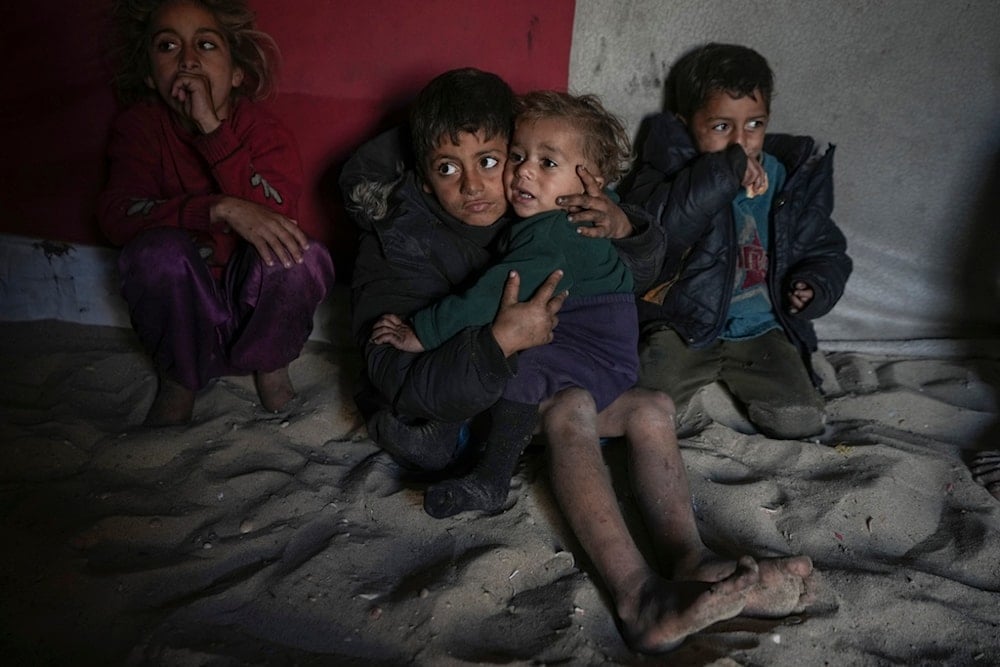'Israel' blocking UNRWA operations jeopardizes social order in Gaza
A senior UNRWA official describes the dire conditions in Gaza as "undignified living".
-

Palestinian Tamim Marouf, 6, sits inside his family's tent alongside his sister Hala, 10, and his brother Malek, 4, at a camp for internally displaced Palestinians on the beachfront in Deir al-Balah, central Gaza Strip, Friday, December 27, 2024. (AP)
Social order in Gaza is put at further risk if "Israel" proceeds with its plans to end the operations of the UN agency for Palestinian refugees, Louise Wateridge, UNRWA's senior emergency officer, warned.
Wateridge, who recently returned from the besieged territory, expressed grave concerns over two Israeli Knesset bills set to take effect at the end of the month. These measures would block all cooperation with UNRWA, effectively halting the agency's operations in Gaza and preventing the distribution of critical aid in a war zone.
"If we're no longer able to communicate to the Israeli authorities, we no longer have a deconfliction process in place, so none of our buildings will be de-conflicted or protected anymore, and we simply won't be able to be there," Wateridge stated.
Despite current challenges, Wateridge noted that social ties among Palestinians and their trust in UNRWA have helped prevent total chaos. "If people don't have flour one day, people understand and trust that the agency will do what they can because it's their cousin or brother that works at UNRWA," she said. However, she warned, "If that agency is removed, it takes this buffer away, and what's to say people don't fight more? I'm surprised social order hasn't collapsed more than it has. People have been pushed to the brink."
Read more: UNRWA warns of Israeli ban cutting aid to millions in Gaza
Deteriorating living conditions
Wateridge described the dire conditions in Gaza as "undignified living". She recounted stories of families displaced into tents and schools, struggling with inadequate shelter, flooding, and infestations. "My friend's sister had hepatitis A this summer, and she didn't have fluids. There's no fluids in the hospital, so she's just suffering in this tent," she explained.
In the central area of Deir al-Balah, approximately 20,000 people are sheltering in classrooms, while an additional 60,000 camp outside the schools hoping to access limited aid. "It will be about 12 bathrooms for 60,000 people," she noted.
UNRWA under threat
The proposed Knesset bills follow allegations by the occupation that some UNRWA staff were involved in the October 7 operation. As a result, nine staff members have been dismissed, with no proof of the Israeli claims provided. If the agency is shut down, Wateridge warned, "UNRWA does something like 17,000 health consultations a day in the Gaza Strip. It's impossible for another agency to replace that."
Read more: Israeli threat to ban UNRWA looms over Gaza: NYT
Efforts to access northern Gaza remain blocked, with most UN attempts to reach the area denied or impeded by the occupation. Displaced Palestinians arriving from the North frequently report missing family members, often men who have been detained or killed.
Wateridge also highlighted the growing despair among Gaza's population. "If you speak to any person, any civilian, they feel in absolute despair," she said. She described meeting a student forced to live in a toilet at a school who lamented, "My future is ruined. I was supposed to be going to university, and now I'm living in a toilet in a school. I am trapped."
Wateridge's grim outlook can be summed up with, "The bombing and the strikes are one part of this war, and another huge part of the war is the undignified living. Just every aspect of society has gone."
Read more: UNRWA halts aid deliveries through 'unsafe' Karem Abu Salem crossing

 4 Min Read
4 Min Read








